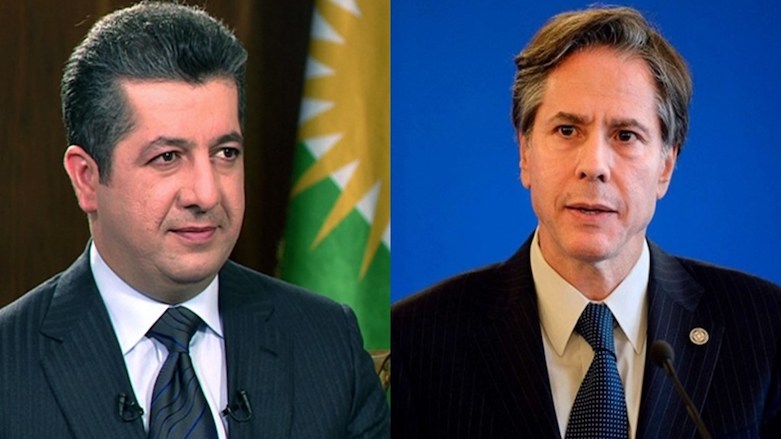US Secretary of State Blinken reaffirms to PM Barzani US commitment to Iraq, Kurdistan Region

WASHINGTON DC (Kurdistan 24) – US Secretary of State Antony Blinken and the Prime Minister of the Kurdistan Regional Government (KRG), Masrour Barzani, held a discussion by telephone on Friday.
They “spoke at length” about “issues of shared interest and concern,” the KRG readout of their conversation explained. “Both strongly condemned rocket and drone attacks against the Kurdistan Region, Iraqi bases, and global coalition forces.”
Blinken “reaffirmed the US commitment to the stability of Iraq and the Iraqi Kurdistan Region,” according to the official US readout. In a tweet, Blinken described the conversation as “productive,” explaining that he had reaffirmed the US “partnership” with the Kurdistan Region.
Had a productive call with Prime Minister Masrour Barzani today to reaffirm our partnership and discuss attacks in the IKR. The U.S. will continue to work with Iraq to address their security challenges and protect U.S. and @Coalition personnel.
— Secretary Antony Blinken (@SecBlinken) April 23, 2021
The two officials “agreed on the continued need for global coalition forces in the country and support for the Peshmerga and Iraqi Security Forces in the fight against ISIS,” the KRG readout stated.
Indeed, the day before, on Thursday, CENTCOM commander Gen. Frank McKenzie had affirmed precisely that in a press briefing.
Answering the questions of Pentagon reporters, who have tended to assume that the US was reducing its troop presence in Iraq, if not leaving altogether, McKenzie stated clearly and unequivocally, “There are no plans to draw down—as we are [doing] in Afghanistan”—in Iraq “right now.”
“It’s very important to realize the Government of Iraq wants us to stay,” the Commander also affirmed.
Read More: CENTCOM: US has 'no plans' to draw down forces in Iraq; Baghdad wants us to stay
The discussion between Barzani and Blinken followed two recent attacks on facilities where US forces are based. On April 14, an explosive drone detonated above Erbil's international airport. It caused no casualties and only minimal physical damage, but represented the introduction of a new weapon into the theater by Iran and its Iraqi proxies.
McKenzie explained that such small drones—quadcopters—were of great concern to him. US air defense systems, like the Patriot, which is stationed in Erbil, can see missiles and bigger drones, but they cannot see a quadcopter, which can be smaller than a person’s arm, and, therefore, cannot defend against it.
The Iraqi government is under pressure from Iran to oust US forces from the country, and McKenzie’s statements represented the clearest public affirmation that the US still plans to keep troops in Iraq.
Within hours of McKenzie’s briefing, rockets were fired at Baghdad International Airport, where US forces are based. One Iraqi soldier was injured.
Read More: 3 rockets hit Baghdad airport base housing US troops: security sources
Kurdistan Region, Relations with Federal Government
The conversation between Barzani and Blinken also addressed a number of issues related to the internal affairs of the Kurdistan Region, as well as its relations with Baghdad.
The Kurdish Prime Minister updated Blinken on his government’s “aggressive reforms,” the KRG readout explained, while “he urged Secretary Blinken to expand technical assistance and economic support to the KRG and encourage US investment in banking.”
They both agreed on the need for “more unity between Kurdish political factions.”
Barzani also detailed to Blinken the situation in the Yezidi homeland of Sinjar (Shingal), including Barzani’s “ongoing dialogue” with Iraqi Prime Minister Mustafa al-Kadhimi and other Iraqi leaders.
Last October, the KRG and the Federal Government reached an agreement to restore security and services to the Shingal area. However, the militias and armed groups that dominate there, including elements of Iraq’s Popular Mobilization Forces (PMF) as well as the Kurdistan Workers’ Party (PKK), have resisted leaving the area and the agreement has yet to be implemented.
Read More: KRG and Baghdad reach administrative, security agreement on Sinjar
Blinken and Barzani concurred on the importance of the “full implementation” of the agreement.
They both also welcomed the recent passage of Iraq’s federal budget law. Barzani explained that the KRG “expects Baghdad to start payments as soon as possible,” while he urged Blinken “to personally intervene to ensure the Kurdistan Region receives a ‘fair and equitable’ share of international loans to Iraq.”
They also discussed Iraq’s upcoming elections and both stressed the importance of a free, fair, and credible vote.
Editing by Joanne Stocker-Kelly